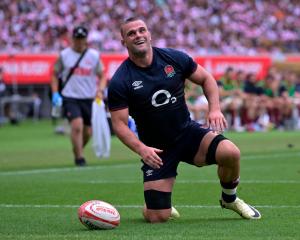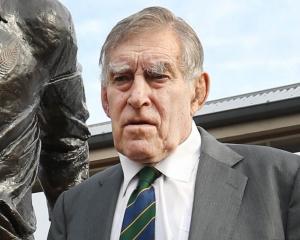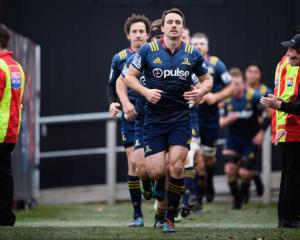
Carter will probably reminisce about his next three-pointer though - slot a penalty or even a rare dropped goal against Wales at the Millennium Stadium on Sunday (6.15am NZT) and the 28-year-old overtakes Jonny Wilkinson as the international game's most prolific scorer.
Carter closed to within two of the Englishman's 1178-point haul against Ireland last weekend - and after converting seven of his eight attempts in Dublin only injury can prevent him becoming the first New Zealander to inherit the accolade in the modern era.
Unless Carter brings up the milestone with his 30th test try there will be a sense of symmetry when the relatively unfamiliar Webb Ellis ball bisects the posts.
Carter started his test career against Wales seven years ago and it was Sunday's referee, the Irishman Alan Lewis, who urged him to get a move on when he seemed transfixed by the uprights that night at Waikato Stadium.
The conversion of Doug Howlett's try in the 20th minute of what turned into a record 55-3 rout is the kick that Carter still, well, gets a kick out of.
"I still remember my very first one," he said.
"I just stood there and wanted it to go over to settle the nerves a bit, I managed to get it through the posts."
After labouring over his first use of the tee, Carter added five more conversions, a penalty and a try to kick start his 78-test career with a 20-point haul, a scoring trend he has continued against the unfortunate Welsh.
In eight tests he has accumulated 150 points, 18.75 per game - another indication Wilkinson will be relegated to second class status, if only temporarily.
A World Cup winning pivot four months after Carter made his debut, Wilkinson is currently recovering from his latest shoulder injury so was unavailable for the autumn internationals - but the 31-year-old intends to be back for the Six Nations in February.
"I'm sure he'll get that record back," Carter admitted.
"He's a class act, he's been around a long time and he's got a few more games in him as well."
The realisation his time at the top may be limited probably contributed to Carter downplaying his impending achievement.
He was also mindful of placing greater importance of the All Blacks completing their fourth Grand Slam.
"The biggest priority is the Grand Slam. I always prefer to put the team first," he said, before acknowledging some personal pride was also at stake.
"I'm not big on these types of records but this one is pretty special. If I can get those three points I'll be pretty happy."
The All Blacks have not been truly tested since their 24-26 Bledisloe Cup defeat en route to the UK and Ireland - a loss perpetuated by Carter being substituted with a quarter remaining - but the Cantabrian's achievement is still no mean feat.
He's not exactly playing on one leg but his right ankle continues to irritate him.
"It's not the most attractive ankle, it's still pretty swollen and functionally not working all that well," he said.
"It still needs a little bit more time to settle down."
So Carter will spend December and January adhering to a training and rehab regime designed to ensure he will be fully fit at the start of the 2011 Super rugby campaign.
Carter suspected the ankle - before it was operated on once the Tri-Nations crown from retrieved from South Africa in August - was a reason for a couple of average kicking years by his high standards.
There now seems little doubt the procedure has worked wonders even if the discomfort remains.
In four tests on the end-of-year tour Carter has an 84.6 per cent success rate with the boot; he has missed only four of 26 attempts.
Carter was flawless at Murrayfield, converting all five tries scored before he departed but his strike rate against Ireland was also impressive given the difficult angles and unusual atmosphere he confronted at Aviva Stadium - almost total silence when he lined up posts.
"It's really tough. You'd probably prefer the crowd to be booing you and making lots of noise," he said.
"When it's dead silent it can start to play on your mind."












